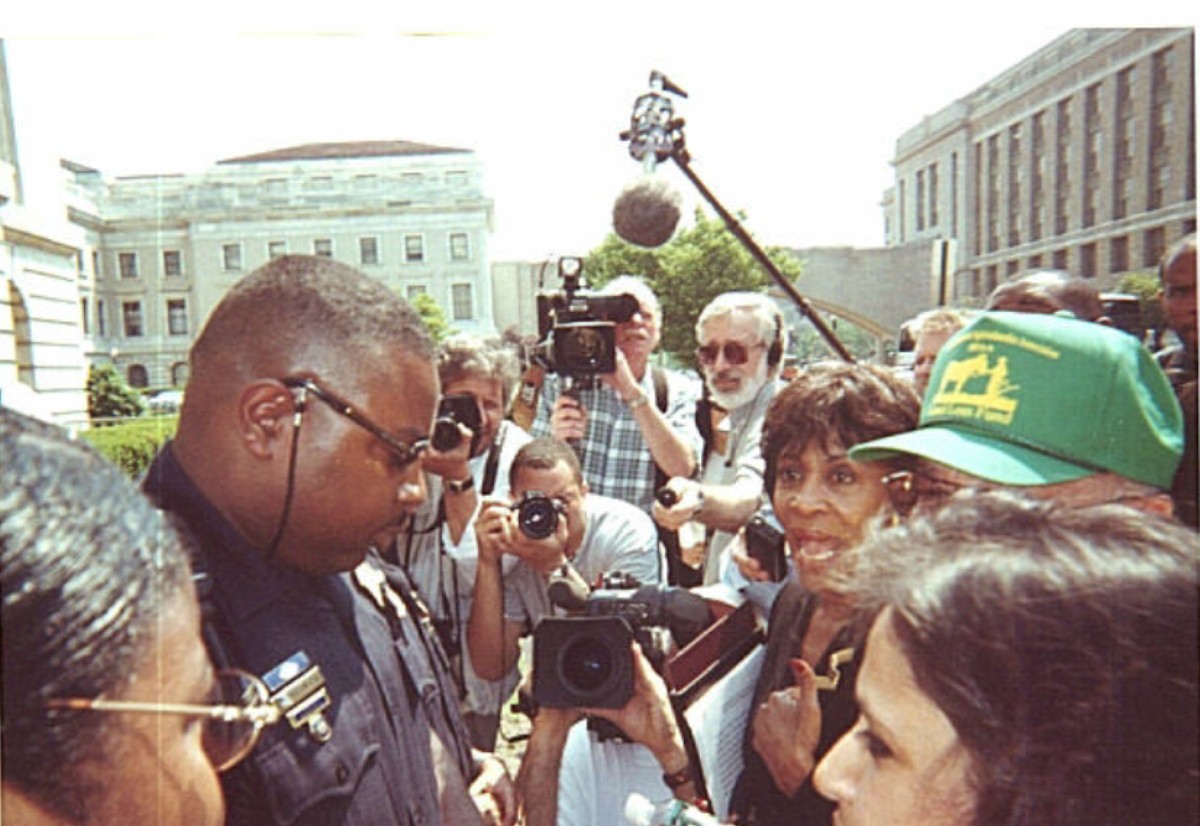Volume
2, Number 8
November 8, 1999
The
Farmer
———————————————————————–
Farm Tour: and who will carry on
the legacy?
by Dr. Ridgely A. Mu’min Muhammad
A
chartered bus pulled out of the parking lot at Fort Valley State University in
Georgia on Friday morning, November 5, 1999.
Its mission was to visit three Black farms in Georgia to get a better
understanding of the problems, successes and future of black farming in America.
On board were farmers, researchers, administrators, USDA employees, farm
activists, project directors and extension personnel.
It took us two hours just to reach the first farmer, but in that period
the "academic type" got a rare chance to sit and talk with farmers in
an informal setting without looking at their watches and being concerned about
their work load. The farmers
finally had them hostage. (smile) Many
of these "academic type" had no idea about the evil being reeked upon
Black farmers and their families. They
learned about the lawsuit and the reasons behind that suit.
They learned how even today, white men who have charge of government
programs in these rural counties are demanding sexual favors from these Black
farmers wives and daughters in order for these farmers to get what is rightfully
theirs. Slavery is not over.
Black people in the cities instinctively know this and this is why
students shy away from anything sounding like "agriculture" when they
pick careers.
We first visited the farm of the Robert Brothers.
These elderly brothers have been successful small size farmers all of
their lives and have managed to keep in tact the family legacy comprising of 200
acres of prime farm land. They are growers and marketers of high quality produce
throughout Georgia, Florida and the Eastern United States. They specialize in
watermelons and are reported to produce some of the sweetest watermelons in the
country. I tried to get some tips.
They gave me a few, but I guess I would have to work as an apprentice for
one summer to get the rest. (smile)
I joke about this apprenticeship thing but seriously something has to be
put in place to preserve this legacy and knowledge.
These three brothers said that none of their children plan to continue
farming. Mr. Robert
said that "…as long as you can import food from overseas, get it
to the local markets and sell it cheaper than I can grow it, then there ain’t
much incentive to get young people to do this."
Our next visit was to the Kennedy Farm.
The Kennedy family is carrying on the 150 year tradition of farming a
2200 acre spread which they have converted from row cropping to cattle and horse
raising. Their homes are beautiful
and their farm is immaculate, I was jealous. (smile)
But again none of these great men could guarantee that this tradition
would carry on after they leave. One
thing that many people don’t know is that most Black farmers have other jobs and
are highly skilled. To be a success
at farming you must know farming, livestock health, first aid, equipment repair,
electrical wiring, plumbing, truck and auto repair, building construction, heavy
equipment operations, welding, metal fabrication, accounting, marketing, law,
government regulations, and a hell of a lot about human nature. In
other words everything you need to know to be independent in America.
When we lose these type of men and women, we have lost more than the land
Next we visited the Jessie Rhodes’ farm and small farm vegetable
cooperative. This Black man can
sure grow some collards. He is
experimenting and inventing all the time. The
Black farmers in that area have organized themselves into a cooperative because
they realized that they can not compete with the big farmers in terms of volume
and price. They share markets as
well as equipment and labor. They now want to hook up with other black farm
cooperatives so that they can be like the Vidallia Onion co-op which produces 70
percent of the onions leaving Georgia.
This trip exposed one of the major problems in servicing and organizing
the Black farmers. We left Fort
Valley at 9:00 a.m. and did not return until 11:30 p.m.
We spent most of our time on the bust, which allowed no more than 30
minutes for each farm visit. The
farmers are so far away from potential help and markets that the logistical
problem of coordinating them is tremendous.
Do we have any military veterans trained in logistics?
It is going to take such expertise and skills to save the few Black
farmers that are left and preserve a legacy.
For further information about these farmers contact Dr. Clarence Johnson,
Associate Professor of Horticulture at (912) 825-6831 or Dr. Glenwood F. Hill,
Program Leader – Agriculture &
Natural Resources at (912) 825-6269. For
more information about Black farm issues visit Muhammad Farms web site at:
http://personal.lig.bellsouth.net/~drridge
Thank you.
If you have any questions, please e-mail Dr. Ridgely A. Mu’min Muhammad at drridge@bellsouth.net


